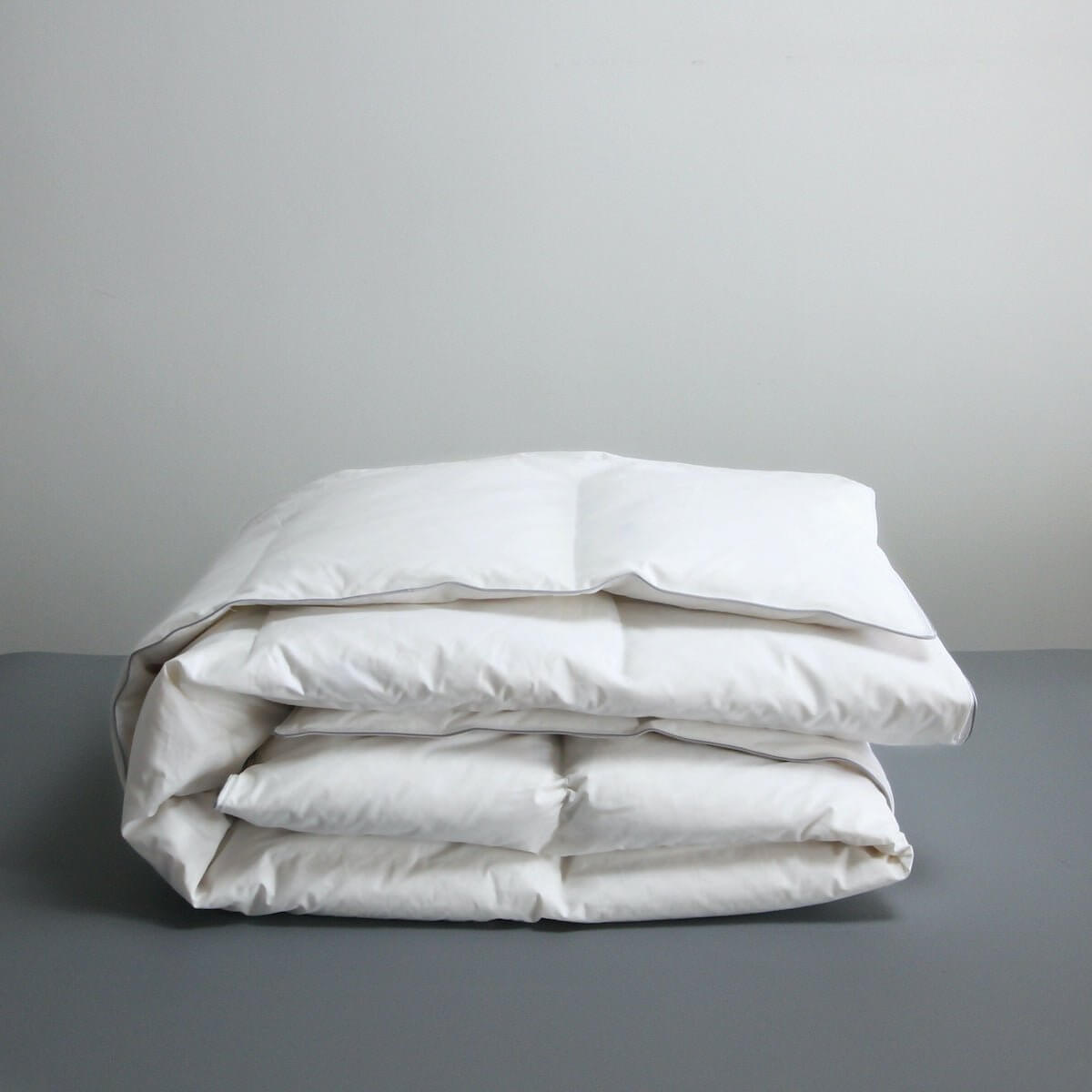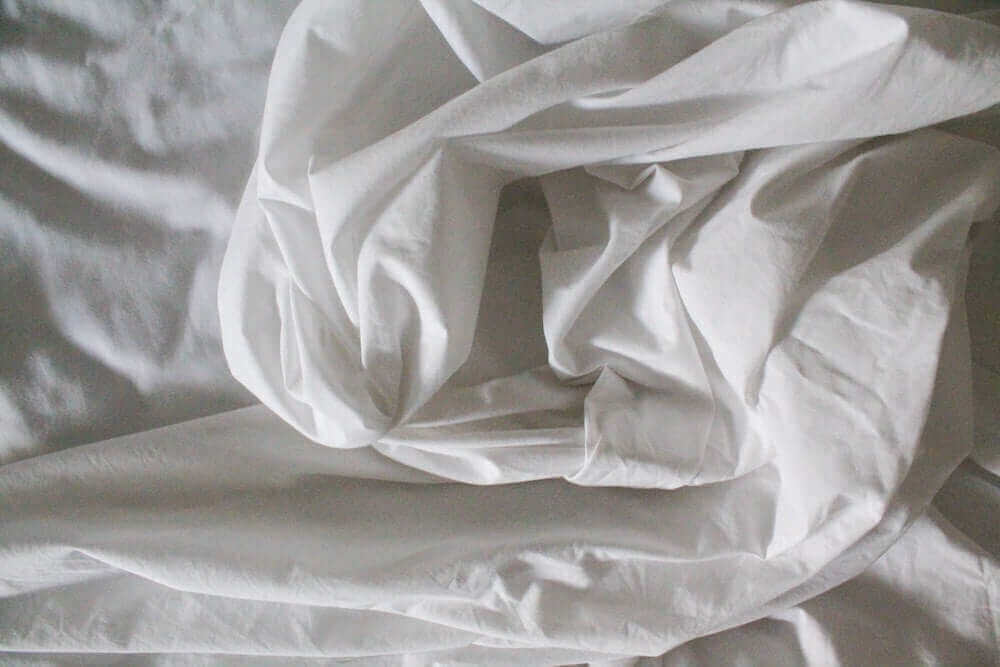With busy work schedules and hectic social lives, it’s not surprising that household chores can often fall by the wayside. After a long day in the office, often the last thing you want to do is pick up the vacuum or start wiping down surfaces.
But, there’s one household chore that many people postpone for much longer than they should - washing and changing their bedding. This is something everyone should prioritise when it comes to cleaning your home and putting personal hygiene first.
How often should you change your bedding and why is it so important?
How often should you change your bedding?
According to microbiologist Laura Bowater, as reported on GoodtoKnow, it’s best to wash your bed sheets, pillowcases and duvet covers at 60 degrees on a weekly basis.
For many people this may not seem realistic, especially when you’ve got a full-time job to uphold, relationships to maintain and a whole other list of responsibilities to contend with.
But, for the best night’s sleep possible, it’s worth changing your bedding at least once a fortnight. We recommend storing a selection of fresh bed sheets in your airing cupboard for this occasion. This will prevent you from becoming locked into a cycle of washing and drying your bedding on the same day.
It doesn’t stop there. Bowater also recommends steaming your mattress every six months. This is because many of the bacterial strains and dust mites that become trapped in your bed sheets can also become buried in the bed itself.

Luxury Bedding Sets
Upgrade your sleep
with deliciously soft bedding sets
crafted from premium cotton.
Why is it so important to change your bedding?
One of the most important reasons to wash your bedding frequently is to get rid of any unpleasant bacteria or dust mites that you may be sharing your bed with.
Having dust mites in your bed isn’t just uncomfortable to think about - it’s also unhygienic. They may trigger bouts of coughing or even eczema, which is something you’ll want to avoid at all costs.
As you toss and turn throughout the night, you also shed sweat and skin cells. Even if you shower every night before bed, you’ll still need to wash your bedding to get rid of any oils or dirt you leave behind as you sleep.
This is especially important during the summer or if you’re battling an illness, as you’re more likely to sweat and spread bacteria as you sleep. With this in mind, it’s essential to put your sheets in the wash following a period of sickness or hot weather.
Washing your bed sheets and pillowcases frequently is important for sleep that leaves you feeling revitalised and refreshed, as is finding luxury bedding produced with quality cotton. At Bedable, we’re proud to offer just that.
Our 100% cotton bedding bundles are produced in simple, sophisticated designs and can be delivered to your front door at your convenience. For bed sheets you never want to go without, browse our collection online or get in touch with us at Bedable today.
People Also Asked
Is it okay to change bed sheets once a month?
Changing bed sheets once a month is not recommended for optimal hygiene. Ideally, bed sheets should be changed weekly to remove accumulated sweat, dead skin cells, and dust mites. Monthly changes may lead to an unhygienic sleeping environment and potential skin irritations.
How often do British people change their bedding?
British people typically change their bedding every two to three weeks on average. However, health experts in the UK recommend changing bed sheets weekly for optimal cleanliness and hygiene. Factors like personal habits, allergies, and lifestyle can influence individual practices.
How long can you go without changing bedding?
While it's possible to go several weeks without changing bedding, it's not advisable. The maximum recommended time is two weeks, but ideally, bedding should be changed weekly. Prolonged use without changing can lead to a build-up of bacteria, dust mites, and allergens, potentially affecting sleep quality and health.
How frequently should bedding be washed?
Bedding should be washed once a week for optimal hygiene. This frequency helps remove sweat, dead skin cells, and dust mites that accumulate over time. For those with allergies or who sweat heavily, more frequent washing may be beneficial. Pillowcases might require even more frequent changes due to facial oils and products.
How often do married couples change their sheets?
Married couples typically change their sheets every two weeks on average. However, health experts recommend changing sheets weekly, especially for couples sharing a bed. Factors like body heat, sweat, and skin cells from two people can lead to faster accumulation of dirt and bacteria.
Why are there crumbs in my bed?
Crumbs in your bed are often the result of eating in bed or not changing clothes before lying down. They can also come from dead skin cells, which we naturally shed. Regular vacuuming of the mattress and frequent sheet changes can help minimise this issue. Avoiding food in the bedroom is the best prevention method.
How often do Americans change bed sheets?
Americans, on average, change their bed sheets every 24 days. However, this varies widely among individuals. Health experts in the US, like their British counterparts, recommend changing sheets weekly for optimal hygiene. Factors such as lifestyle, personal habits, and health conditions can influence sheet-changing frequency.
How often do hotels change their bedding?
Hotels typically change bedding between each guest stay. For longer-staying guests, most hotels change sheets and pillowcases every three to four days. Luxury hotels might offer daily changes. This frequent changing ensures hygiene standards are maintained and contributes to the fresh, clean feeling associated with hotel beds.
How often should I change my pillowcase?
Pillowcases should be changed more frequently than other bedding, ideally twice a week. This is because pillowcases come into direct contact with your face, collecting oils, sweat, and skin cells. For those with acne-prone skin or allergies, changing pillowcases every other day can be beneficial.
What happens if you never change your bedding?
Never changing your bedding can lead to several health issues. Over time, bedding accumulates sweat, dead skin cells, dust mites, and bacteria. This can result in skin irritations, allergic reactions, and respiratory problems. The build-up of these elements can also create an unpleasant odour and potentially impact sleep quality.
Why do clean sheets feel so good?
Clean sheets feel good due to several factors. They provide a fresh scent and a crisp texture against the skin. Psychologically, clean sheets are associated with comfort and relaxation. Physically, they're free from accumulated sweat, oils, and allergens, which can make sleep more comfortable and refreshing.
How often should you throw away your bedding?
Bedding should typically be replaced every 2 to 3 years, depending on quality and care. Pillows may need replacing more frequently, about every 1 to 2 years. Signs it's time to replace bedding include visible wear and tear, persistent stains, or a decrease in comfort. Regular washing and proper care can extend the life of your bedding.
How often should I change my towel?
Bath towels should be changed and washed every three to four uses. However, if you live in a humid climate or the towel remains damp between uses, more frequent changes are advisable. Hand towels, which are used more frequently by multiple people, should be changed every couple of days.
What is the best bedding for dust mites?
The best bedding for managing dust mites includes tightly woven fabrics like microfiber or high-thread-count cotton. Hypoallergenic and dust mite-proof covers for mattresses and pillows are highly effective. Materials like bamboo or silk are naturally resistant to dust mites. Regular washing in hot water (at least 60°C) is crucial for any bedding type.
What happens if you don't wash your bedding for months?
Not washing bedding for months can lead to a significant build-up of dead skin cells, sweat, oils, and dust mites. This accumulation can cause or exacerbate allergies, skin irritations, and respiratory issues. The bedding may develop an unpleasant odour and discolouration. It can also become a breeding ground for bacteria and fungi, potentially leading to various health problems.
How often do girls change sheets?
The frequency of sheet changing isn't gender-specific, but studies suggest that women tend to change their sheets slightly more often than men. On average, women change their sheets every 19 days, compared to men who change them every 30 days. However, health experts recommend weekly changes for everyone, regardless of gender.
How often do most married couples sleep together?
Most married couples sleep together every night, but this can vary based on factors like work schedules, health issues, or personal preferences. Studies suggest that about 12% of married couples sleep in separate beds. The key is finding an arrangement that ensures quality sleep for both partners, which can positively impact the relationship.
What's the longest you should go without changing your sheets?
The longest you should go without changing your sheets is two weeks. However, this is the maximum, and weekly changes are ideal for maintaining proper hygiene. Factors like sweating, eating in bed, or having pets on the bed may necessitate more frequent changes. Prolonged use without changing can lead to a build-up of allergens and bacteria.
Why is there a dip in the middle of my bed?
A dip in the middle of your bed is often caused by regular use and weight distribution over time. This is especially common in spring mattresses. Factors contributing to this include the quality of the mattress, the weight of the sleepers, and the age of the mattress. Rotating your mattress regularly and using a mattress topper can help prevent or minimise this issue.
How often should you buy new sheets?
New sheets should be purchased every 2 to 3 years on average. However, high-quality sheets may last longer with proper care. Signs that it's time to replace sheets include thinning fabric, yellowing, persistent stains, or loss of comfort. Regular washing and proper storage can extend the life of your sheets.
What is the white stuff on my bed?
The white stuff on your bed could be several things. Most commonly, it's dead skin cells that we naturally shed. It could also be dried sweat or salt crystals from evaporated perspiration. In some cases, it might be lint from bedding or clothing. Regular washing of bedding and vacuuming of the mattress can help reduce this build-up.
How often should I wash my hair?
Hair washing frequency depends on your hair type, lifestyle, and personal preference. On average, washing hair 2 to 3 times a week is sufficient for most people. Those with oily hair might need daily washing, while those with dry or curly hair might wash less frequently. The key is to maintain scalp health without over-stripping natural oils.
Should I wash my sheets while I'm sick or after?
It's best to wash your sheets after you've recovered from illness. While sick, change your pillowcase daily if possible. Once you're well, wash all bedding in hot water to eliminate any lingering germs. This practice helps prevent re-infection and ensures a clean, fresh start post-recovery.
How often should I wash pillows?
Pillows should be washed every 4 to 6 months. This helps remove dust mites, dead skin cells, and sweat that accumulate over time. However, pillow protectors and cases should be washed more frequently, ideally weekly with your sheets. Always check the care label, as washing methods can vary depending on the pillow material.
What is the difference between a duvet and a comforter?
The main difference between a duvet and a comforter lies in their design and use. A duvet is typically a plain, down-filled insert that requires a separate, washable cover. A comforter is a quilted, decorated blanket that's ready to use without a cover. Duvets are more common in Europe, while comforters are popular in North America. Duvets offer more versatility in changing room decor, while comforters are generally easier to maintain.
Why are hotel bed sheets so nice?
Hotel bed sheets feel nice due to several factors. They're often made from high-quality, long-staple cotton with a high thread count, resulting in a smooth, soft texture. Hotels typically use percale weave sheets, which provide a crisp, cool feel. Regular professional laundering with industrial-grade machines and detergents keeps the sheets clean and fresh. Hotels also frequently replace their linens, ensuring they're often newer and in better condition than those in many homes.
What happens if you haven't changed bed sheets in a month?
Not changing bed sheets for a month can lead to a significant accumulation of dead skin cells, sweat, oils, and dust mites. This build-up can cause or exacerbate allergies and skin irritations. The sheets may develop an unpleasant odour and visible staining. It also creates an environment conducive to bacterial growth, potentially leading to various health issues. While not immediately harmful, it's far from ideal for maintaining good sleep hygiene.
What happens if you use the same bed sheet for months?
Using the same bed sheet for months without washing can have serious hygiene implications. The sheets will accumulate a substantial amount of dead skin cells, sweat, body oils, and dust mites. This can lead to skin irritations, allergic reactions, and even acne breakouts. The sheets may become visibly discoloured and develop an unpleasant odour. Moreover, this environment becomes ideal for bacterial and fungal growth, potentially causing various health issues.
Is it unhealthy to not change sheets?
Yes, it is unhealthy to not change sheets regularly. Clean sheets are essential for maintaining good sleep hygiene and overall health. Unwashed sheets accumulate dead skin cells, sweat, oils, and dust mites, which can lead to skin irritations, allergic reactions, and respiratory issues. Regular sheet changing helps prevent the build-up of bacteria and allergens, ensuring a healthier sleep environment.
What happens if you don't wash your sheets for 2 months?
Not washing sheets for two months can lead to a significant build-up of dead skin cells, sweat, oils, dust mites, and bacteria. This accumulation can cause or worsen skin irritations, allergies, and respiratory problems. The sheets may develop visible stains, an unpleasant odour, and potentially harbour harmful microorganisms. This unhygienic environment can negatively impact sleep quality and overall health.
How long is too long to change bed sheets?
Anything beyond two weeks is generally considered too long to go without changing bed sheets. Ideally, sheets should be changed weekly to maintain optimal hygiene. Factors like personal habits, health conditions, and climate can influence how quickly sheets become dirty. Regular changing prevents the build-up of allergens, bacteria, and unpleasant odours, ensuring a clean and comfortable sleep environment.










Share:
5 Simple Ways to Update Your Bedroom For Winter
Why Striped Bedding is Our Favourite